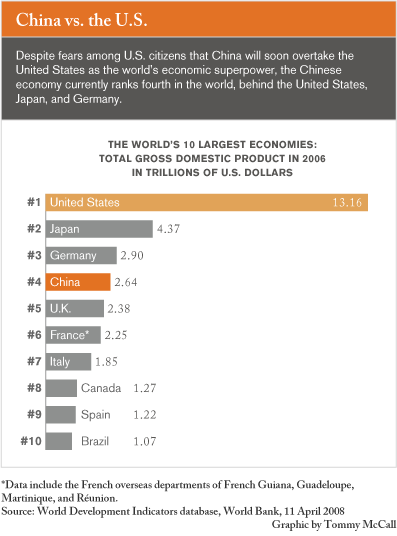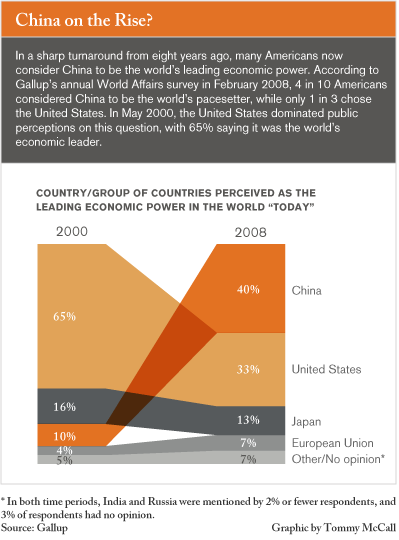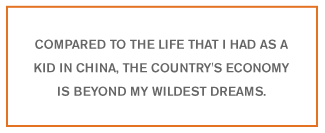China has 1.3 billion consumers and will have 1.4 billion by 2010. China's exports of manufactured goods rose at a 19% annual rate from 1990 to 2006. Measured by GDP, China's economy was the fourth largest in the world in 2006 at $2.644 trillion (USD); measuring GDP on a purchasing power basis, China's economy ranked second in the world in 2006 at $6.091 trillion international dollars. All in all, it seems like there's no way the United States can keep its leadership position in the world's economy.
 |
Not so fast. Though the statistics above are correct, and China is indeed a formidable economic force, the country is not yet dominant and likely won't be in the near future, say two Gallup experts. China has too many internal challenges -- lack of infrastructure, rising costs, and entrenched poverty, to name a few -- to overtake the U.S. economy any time soon.
But that doesn't mean there aren't opportunities in China. In this interview, Gallup's chief economist, Dennis Jacobe, and Tao Wu, senior research director of Gallup China, discuss how the economic boom has changed China, what stands in the way of further growth, and what companies from other countries should know before they try to set up shop there.
GMJ: In a recent survey, Gallup asked adults in the United States what country they think is the leading economic power in the world today; 40% named China, while 33% considered the United States the world's leading economic power. Do you think China's economy has overtaken that of the U.S. economy as the world's leader?
Dr. Jacobe: I'm not really surprised by this response on the part of many Americans -- nor by how it differs dramatically from the 65% who thought the United States was the world's leading economic power eight years ago and only 10% who gave China such status at that time. [See graphic "China on the Rise?" and article "Americans See China Crowding Out U.S. as Economic Leader" in the "See Also" area on this page.] To most Americans, it seems as if everything they buy comes from China or another foreign country. At the same time, Americans see one manufacturer after another shifting their production overseas and essentially closing their U.S. operations.
 |
Further, Americans are pretty worried about the U.S. economy right now, in sharp contrast to the way things were at the top of the dot.com boom in 2000. Gallup's daily consumer confidence measures show more than 40% of Americans rating the U.S. economy poor and roughly 85% saying the economy is getting worse, not better -- and both measures are consistent with recessionary conditions. As a result, many Americans aren't as sure as they once were about the economic prowess of the United States.
On the other hand, the United States remains the world's economic superpower. Will the Chinese economic miracle allow it to surpass the United States in the next 20 years? My guess is, that won't happen. China has come a long way in a short period of time. China will continue to grow and increase its position in the global economy. But I think China has a long way to go and many hurdles to surmount before it overtakes the United States as the world's economic leader.
Dr. Wu: If you ask the Chinese people, not many would say that China will become the next superpower soon, and they probably have a better understanding of China's standing than most. The answer you would receive would also vary depending on whom you ask in China. If you ask farmers, and more than half of Chinese people live on a farm, they don't believe China will be the next superpower any time soon based on their own living conditions. They have perhaps a more realistic picture of China's positioning in the world.
 |
GMJ: What are some of the hurdles you mentioned?
Jacobe: China has many of the characteristics of an emerging country. It doesn't worry much about things like pollution, worker conditions, safety, or other public benefits that tend to improve as a country's overall level of economic well-being increases. As an economy matures, people start to place public value on working conditions. But when a country is still trying to increase its minimum level of nutrition and education and those kinds of things for many of its citizens, then cleaner air or water are luxury goods. That's where China is now.
The next step in China's evolution as a global economic powerhouse will require it to leap a number of hurdles. For example, China has gained its position in the global economy by being a low-cost producer. One hurdle will be for China to maintain this competitive positioning in the global economy while simultaneously developing a significant middle class. Additional hurdles include such things as building its infrastructure, modernizing and expanding its financial system, allowing its currency to fluctuate freely in the global marketplace, and improving the overall quality of its products. China also needs to find a way to convince people in the United States and the rest of the world that the rules it plays by as it participates in the global economy are fair.
GMJ: How long do you think it will take for China to create a large, stable middle class?
Jacobe: China is already seeing a middle class emerge, more quickly in urban centers, more slowly in rural areas. The question is, how much freedom of interaction -- in terms of laws, rules, and regulations -- exists within the country to support the development of a middle class? The entrepreneurial spirit is there, other countries are clearly interested in investing in China, and we've seen several Asian countries become very prosperous. In theory, there's no reason why China can't do the same.
But it could take a long time. Infrastructure is a significant issue, as are congestion costs. As more and more stuff is produced -- and more and more people are needed to produce it -- the increased cost of moving goods and people around becomes enormously important. Fuel, roads, energy, transportation, machinery, and logistical systems -- all things that most Americans take for granted -- become major challenges, and creating the necessary infrastructure can take decades.
China is an enormous country, both in population and in land mass, but from an economic point of view, it doesn't all have to be fully developed for China to be an economic powerhouse. A few sections of China could create huge economic growth. Right now, China has many international competitive advantages, and the question is, can it maintain those advantages and continue to grow as it becomes more and more significant in the global economy?
Think of China as a small company -- there's great potential, it can grow rapidly at first, and it shows tremendous promise. But as it gets bigger, it's challenged by its growth, its expenditures, and its infrastructure. Those are the realities that China must confront, but on a vastly greater scale.
Wu: It's happening, though. If you look at the economy of China over the past thirty years, it's been opening up to the outside world, and the economy has been very, very strong and dynamic for the past ten years. Compared to the life that I had as a kid in China, it's beyond my wildest dreams. If you look at the material products we have now -- the houses, cars, televisions, computers, DVDs, you name it -- no one in China ever would have thought they'd be common.
 |
GMJ: But Gallup polls show that many Chinese are worried that the cost of living is outstripping their income, increasing though it is.
Wu: China announced in April that the price of pork had increased 67% over the previous year. The prices of lots of daily necessities are increasing as well, and that's taking a toll on some ordinary people's lives. That's putting some pressure on the consumer's wallet. And if there's economic pressure, people may have to work harder and work more hours, take more jobs, and get more things done. Maybe from that perspective, it's also good for economic growth because the economy is still going strong.
Based on the results of the latest China study Gallup has done -- I was involved in some of the field work, traveling to some very remote places talking to people -- people are pretty upbeat about where this country is going. The majority say China is on the right track. And more than 80% of the people think life is getting better compared to what it was before.
GMJ: The China surveys show that Americans and Chinese prefer domestic brands. They also show that China's consumers are price conscious and skeptical of the quality of Chinese goods. Will the drive for cheap but high-quality goods force China into better manufacturing practices?
Wu: I think it's an interesting question. But remember, China is a big market. And it's not one market; perceptions vary depending on whom you talk to. The majority of consumers would say that they prefer a local brand. But if you talk to folks in urban areas, especially younger people, they'll say they want foreign brands.
In terms of consumer psychology, it's much easier to crack the Chinese market than the Japanese and the Korean market because Chinese consumers feel that foreign products have better quality. Let me give you an example: Budweiser was in Japan for many years trying very hard to open that market, but the market share they got was very small. Then they moved into China. Boom! Now they're becoming a big player in the Chinese market.
If you look at consumer goods in China, you also must distinguish between brands made in China and Chinese brands. Lots of things are made in China, but they don't all have a Chinese brand. In urban areas, most of the dominant brands are foreign or a joint venture. Urban Chinese believe that foreign products have a superior quality.
GMJ: The data also showed rising incomes and market reach in rural China.
Wu: Rural China is a growing market. But foreign brands will have to work pretty hard to make some inroads into those markets because Chinese companies probably know the market better than foreign companies do. They also have more experience with the logistics -- how to build channels, how to do shipments, and how to establish a retail presence.
Except for a few companies like Coke and Procter & Gamble, not many big foreign brands are active in the rural market yet. Their presence is still small compared to the local companies. Big brands will have to work hard to gain market share. But even in the rural market, we cannot put all consumers in one category. The income gap between the rural rich and rural poor is even bigger than the income gap between the urban and rural regions. So even in rural areas, there are pockets where the rural population has pretty decent buying power.
GMJ: What about entrepreneurism among the Chinese? What opportunities are emerging for people both in China and the United States to grow their business in China?
 |
Jacobe: I think there is tremendous opportunity in China for Chinese and American entrepreneurs. In this regard, probably the best thing China can do to promote entrepreneurism is to build its infrastructure. The interstate highway system in the United States opened up the country to development. To open up rural areas in China, the country will need similar infrastructure.
It's theoretically possible to apply experimental approaches to development in a place like China, where the rules are fairly free. Outside investors really need to partner with people in China. The Chinese form business relationships over many decades. It's something a foreigner can do very well, but you must be very careful. You must have experienced and well-trusted partners. It's a profound mistake for any American to assume that the rules of doing business in China are just like ours.
I also think it would be a mistake for Americans to fear the evolution of China into a major economic power. I think China and the United States are much more interdependent economically than many people in both countries seem willing to admit. But, once again, Americans shouldn't assume that China looks at the rules of international trade and finance the same way we do.
The U.S. economy is a marvelous and adaptive creation that tends to optimize on the talents of the American people, and that will keep the United States highly competitive in the future global economy no matter how it evolves in the decades ahead. More importantly, however, the global economy is not a zero-sum game for competing nations. As long as the rules of the game are equitable in the perceptions of all participants, there is plenty of room for both the United States and China to grow and prosper during the years ahead -- and make the global economy bigger and better for everyone as they do so.
-- Interviewed by Jennifer Robison